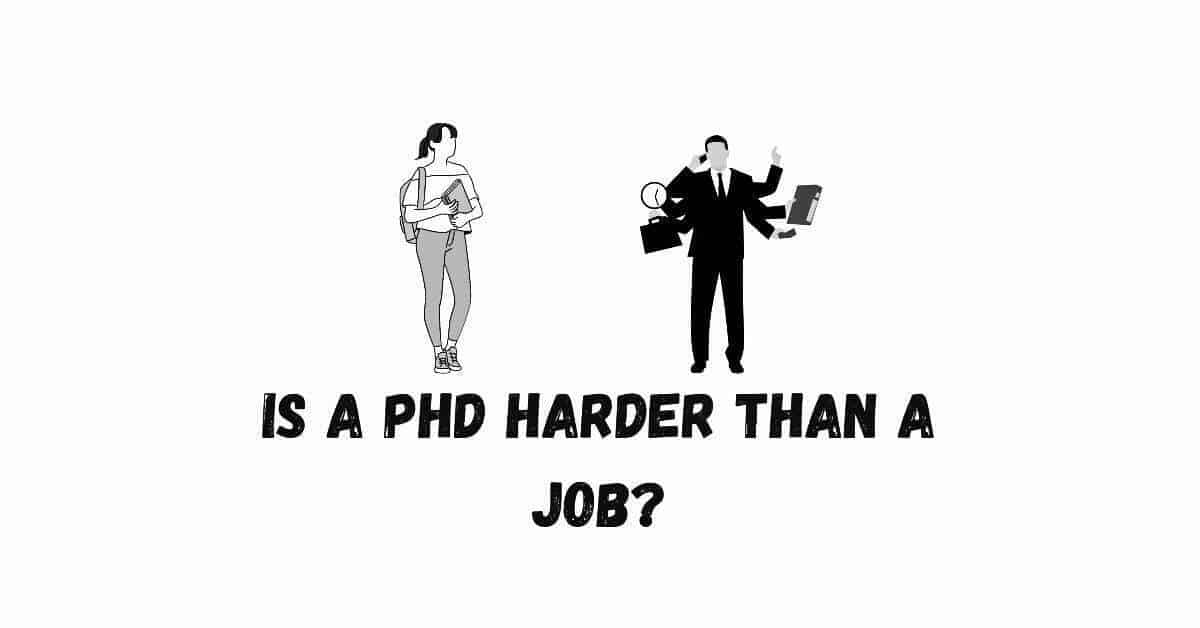Overall, a PhD can be harder than a job due to uncertainty, project responsibility, academic hierarchy, and unpaid-long work hours. However, there can be some cases where a job might be more demanding compared to a PhD. Thus, it really depends on the nature of a PhD or job.
To get a glimpse of why a PhD is hard, you can see the major issues reported by the PhD students below

Shortly explained, a PhD is harder than job because
- creating new knowledge is hard. At PhD you are exploring a new area that no one has ever explored before.
- it is not a degree nor a job, it is a research training. You should realize that the PhD is not the summit of an educational hierarchy, instead PhD training lie at the bottom of the research hierarchy pyramid.
- it require longer work hours than a job. There is no off time for a researcher and there is no 8-hour shift limit nor an over time pay. PhD demands everything from you.
- it involves different tasks, projects and milestones. You are expected to manage different works during PhD journey. It can be taking classes, teaching classes, grading assignments, passing the exams, writing grants, attending conferences, collecting data, and writing papers etc.
- it is a long commitment. As PhD is a full-time work. You are going to earn a modest stipend for next 4-7 years. After that your post PhD salary may or may not cover the income gap that occurred during your studies.
Job can be harder than a PhD if
- there is no flexibility for worker in choosing the work topic. Most of the graduates, who are considering PhD are eligible to be knowledge workers. The knowledge workers are those highly skilled individuals who work with information and data.
- it has pressing deadlines. Some jobs are more mentally taxing than a PhD. If you are working in investment banking, journalism or reporting etc. you might feel much more stressed than a PhD while satisfying various stakeholders.
- the job require high responsibility and pressure to make the right decisions. For example, corporate officers, who have to plan adequate resourcing as well as ensure smooth performance of the company.
To read more about what knowledge worker is and what kind of work they do, visit this article at referenceforbusiness.com. These highly specialized workers have very different needs compared to manual workers. They usually prioritize flexibility in their jobs.
Some may argue that a PhD and a job are not comparable. However, we can compare them because
- PhD students work for the academy and we can consider them as an academic workers.
- like all industry workers, PhD students have present as well as future needs.
Please note that
- This article is not for or against a PhD or job
- I am not degrading science or corporate sector here
- I am only discussing this from the perspective individual/worker wellbeing
Are you thinking about doing a PhD like me?
I asked this question to my professors and on different forums during my preparation of the PhD application. This doesn’t mean I was not asking the research-related questions. Just like you, I was trying to make an informed decision about taking the PhD path.
In fact, I later realized that PhD is not a degree like an undergraduate qualification. A PhD is research training. It can be beneficial to ONLY those who are looking for a research career. Otherwise, a job is much easier. A job involves much less workload, work hours, uncertainty, and higher pay and incentives, even in the long run.
Here you can read my article enclosing an in-depth analysis of PhD vs job. If you are in hurry, you can skim through this post’s subheadings to get an idea of PhD vs the job in the industry. In my opinion, some interesting tables and infographics in this post can give you a quick peek.
In general, a PhD in an easier field of study may not make a bump in your salary. On the other hand, PhD that pay highly are much more strenuous than anything you have encountered in your life yet. Normally, the job in the industry is a much better investment of time when we consider financial returns on it.
“The challenge is not income–it’s time. If you as a PhD grad make marginally more than a Master’s graduate, but they entered the workforce a decade earlier, it takes a long time for even an extra $10,000 a year to catch up. The Master’s grad has had the time to build their net worth and network, perhaps buy a house, pay down debt, invest, and just generally get financially healthy.”
Source : Is a PhD Worth It? I Wish I’d Asked These 5 Questions First
Factors that can make a PhD or a job harder
Some jobs are harder than a PhD. Similarly, some PhDs are much more grueling than a job.
The real question is “What Job and What PhD?” If you are comparing a high demanding job with a low demanding PhD, then your perspective might be different than someone getting crushed by the PhD course and research work.
This argument of a challenging PhD or job depends on
- organizational factors
- personal factors
- work nature and conditions
Let me explain why
How good is the work culture?
Workplace-related factors that matter in this evaluation can be
- Supervisor’s support: the support of PhD advisor/ manager/team lead
- Job Description: the expectations from a certain job role/ PhD coursework and research.
- Work environment: academic/ organizational culture.
Let me explain why
Support of PhD advisor/ Manager/ Team Lead
Your PhD can feel much harder with a toxic PhD advisor.Unfortunately, academia still struggles in providing PhD advisors training for soft skills. These soft skills, such as conflict resolution and relationship building, may enable an advisor to be a good research supervisor. Therefore, not all PhD advisors are good mentors. Here you can read the problems PhD students face with a toxic advisor.
Similarly, a bad boss can make your job harder than a PhD. Here is how a bad manager can destroy your career. He/she may damage your career by tarnishing your reputation, preventing your growth, etc. Yet, in the industry, you have options to leave without losing much. This difference gives a job much more advantage as compared to a PhD. Leaving the PhD in the middle means no credit for all the time and effort invested.
Bottom Line: PhD can get hard because you are at mercy of one single person-your PhD advisor.
Expectations from the worker
A PhD requires that you alone are responsible for all the work done. All the work from coursework to assistantship work to data collection is solely on your shoulders. You can skim through this article to get an idea that pursuing a PhD may not be the best choice you have right now.
On the other hand, you might feel that some high demanding and high-stress jobs are rougher than a PhD. In fact, they are. However, a job can be easier than a PhD where
- the work usually distributed vertically or horizontally
- teams make everyone responsible for their part
Bottom Line: A PhD can be harder because you are expected to manage all these tasks and projects single-handedly. Usually, the distribution and breakdown of bigger projects make jobs much easier than a PhD.
Academic/ organizational culture
Workplace culture matters most in determining the attitude of people working within that culture. A supportive organizational culture can make things much easier even in a PhD. Indeed, some institutions consider the PhD students as employees, promote peer cooperation, and provide multi-advisor support to keep things in balance for early career researchers. However, most of the academic culture is not that supportive for the PhD students.
“In most workplaces, a bullying boss would see high rates of employee turnover. But in many ways, lab members are captive, making them more vulnerable to abuse. PhD students and postdocs depend on supervisors for publications, funds and letters of recommendation. Changing advisers means years of lost work and, often, damage to a trainee’s reputation. The longer a lab member remains, the greater their commitment to finishing their work under that person, despite abuse.”
Research is set up for bullies to thrive
The corporate side, on the other hand, claims to provide a more supportive culture. However, that may or may not be the case. Recent studies are putting light on this. The toxic organizational culture is also surprisingly common in the industry.

Still, the job has two advantages here
- Competition in the market push employers to prioritize a supportive culture
- Employees, especially knowledge workers can switch their employers
Bottom Line: In academia, a temporary worker (the PhD student) is more prone to abuse because switching from one workplace to another is much harder.
What does the individual want?
The PhD or job difficulty also really depends on
- The priorities of a person: Your other engagements and personal goals can make PhD feel harder.
- The field of study: PhD difficulty vary by area of subject
- The specific job in comparison: Even the easier PhD can be harder when you compare it with an easier job.
Let me explain why
The priorities of a person
Sure, you love your field and want to contribute to it. This is why you are considering a PhD. This is the same reason why I am interested in a PhD. However, your priorities might differ from mine. Priorities of a person may depend on
- age
- marital status
- economic situation
These differences determine how you will perceive your PhD workload. For example, if I am planning to start a family and you are not, your preferences may differ from mine.
Bottom Line: You might feel a PhD easier and I might feel it a grind.
The field of study
Some PhDs are easy. They involve much less workload. The research work may be easier too. Many, but not all, social science and humanities might feel easy. Also, pursuing a PhD at some diploma mill university might feel easier.
Now the question that comes naturally can be “Are easiest PhDs worth it?”. I think I cant answer this more accurately than Dr. David Maslach. You can watch the video below for this.
If you do not have time to watch the entire video. You can get an idea from the summary of the video below
Here is how Dr. David Maslach summarizes his discussion.

On the contrary, some PhDs are much harder than a job. If you are doing a STEM or finance PhD you might rate a PhD harder than the job you were working in the industry. Below are some highlights of Nature’s PhD survey, 2019. You may get an idea of PhD difficulty by this infographic.
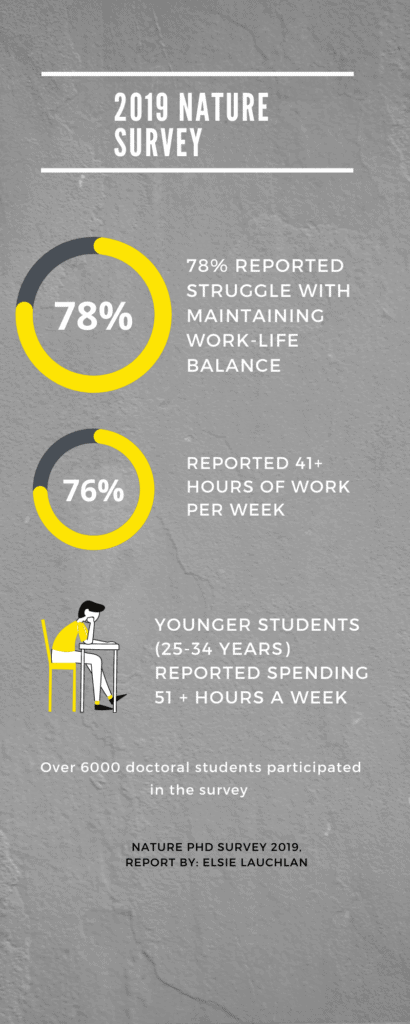
Bottom Line: Not every PhD is harder than a job
The specific job in comparison
Doing customer service might feel harder when you often get harsh feedback from the customers. In such a case, when you switch from doing tables to PhD you might feel a PhD is easier. However, If you switch from cruise ship entertainer to even an easier PhD, you might feel PhD your nightmare.
Bottom Line: Not every job is harder than a PhD
What is the nature of work?
Work conditions can be evaluated on
- Work hours: Long work hours and flexibility in working indicate PhD is harder
- Workload: Longer projects, ambiguity and unpaid overtime make a PhD harder than a job
- Work stress: Higher responsibility, uncertainty and delayed rewards in PhD are likely to make a PhD hard.
- Compensation: Pay during and even post PhD studies may not be able to give a comfortable lifestyle to PhD students
- Career: Unstable post PhD career can also make a PhD struggle difficult to bear.
Work Never Ends
- At PhD, you are always busy. There are no 9-5 boundaries.
- Sometimes you are taking classes, other times you are teaching them.
- If you are having a pause from lab work, you might be working on your supervisor’s research.
- At a PhD, there is always more work that needs to be done.
Thus, there is always someone younger and eager to beat you in the amount of work.
- At PhD, you set your own work schedule.
- You do not have to appear in the office at certain times.
- For some PhD students, flexibility might be a problem.
- The freedom to set your work schedule might lead to stress in managing things.
- Some people need structure and a specific schedule, place, and time to work.
- Flexibility does not mean lower work hours. You may find yourself writing a paper in the evening and preparing for a seminar after midnight.
So,if you are the one who needs an external structure of doing things then a PhD might be hard for you
Some jobs are also never-ending. Many managers, executives, and IT professionals work crazy long hours.
The reasons for long work hours can be
- on call even if you are off duty
- surprise overtimes
- commuting time to workplace
Therefore, the actual work hours of some jobs can also make them harder than a PhD.
Here is a Business Insider article highlighting job roles that may need close to 50 hours a week.
You will find that those average work hours per week for
- Architectural and engineering managers are 46.2
- Petroleum, mining and geological engineers, including mining safety engineers are 49.3
- Sales engineers are 45.4
- General and operations managers are 46.9
Scan this post at Businessinsider.com to know more about the extended work hours for other jobs
No Flexibility-Some people want to set their own work time.
- If you are the one who feels the 9-5 is a burden then you might struggle.
- A rotating shift in an industry job may be a nightmare for you.
- On-call work can also feel tedious.
Thus, if you are someone who wants flexibility in your work schedule. You might rate the job as hard.
Workload
Longer Projects; Easier Deadlines-At PhD, the projects are much longer than in the industry. Multi-year projects can be harder to manage, even for skilled project managers and most young researchers struggle with this scenario. However, academic deadlines might not be pressing if you are a prudent worker. To better manage your deadlines, you may need close collaboration with your advisor and avoid procrastination. PhD is harder because research projects take a longer time to complete. You might be prone to procrastination too.
Ambiguity in prioritizing the tasks-At PhD, you might be working on multiple tasks a day. For example, collecting data before noon and writing some paragraphs in the evening. Yet, what to pursue first and what to delay can be confusing. Cognitive tasks can drain your energy throughout the day, so you should prioritize more important/urgent tasks. As a PhD student, you have the autonomy to set your priorities, this may increase task scheduling anxiety.
Overtime-There is no paid overtime at PhD. If you have any assistantship duty, you should work extra hours to grade assignments or help undergraduate students. It usually delays your own coursework and research progress. In many cases, PhD is prolonged due to this slow progress.
Shorter Projects; Pressing Deadlines-The industry usually has shorter projects. Even if you are in longer projects, your performance/ progress is measured by milestones. Most people find the shorter projects and evaluation of performance by milestones easier. But, you might face tight deadlines to complete the milestones/projects.
Multi-tasking; Clarity in Prioritizing the tasks-Job challenges you with multi-tasking. the industry is fast-paced and often wants you to work on several different things at once. Industry jobs expect you to organize meetings, take client calls, and write reports at the same time. Yet, the industry job gives you much more clarity. This clarity might come from the repeatable nature of tasks or directions by the supervisor or client. Multi-tasking may make your job difficult.
“Multitasking reduces your efficiency and performance because your brain can only focus on one thing at a time. When you try to do two things at once, your brain lacks the capacity to perform both tasks successfully.”
Multitasking Damages Your Brain And Career, New Studies Suggest
Overtime-Many jobs also include overtime. This overtime can be paid or unpaid. It feels exhausting when you are working late at night or reporting for on-call work. Overtime paid or unpaid can make the job feel harder
Work stress
Individual Responsibility-At PhD, you are the designer and executioner of your research projects. Thus, you are responsible solely for the project’s success. If something goes wrong and things mess up, you alone will be responsible. Thus, a PhD student you are alone responsible for the whole research project.
Uncertainty; Freedom-One thing is clear, a PhD is all about uncertainty. You do not control many elements in your PhD. You will face uncertainty on every step during the PhD, like
- availability of teaching assistantship work
- any publishable results
Yet, a PhD time gives you the freedom to work on whatever most interests you. PhD freedom also means you can choose who to spend your day with. So, PhD is about freedom and uncertainty usually accompanies freedom.
Delayed Gratification-You will be rewarded for your research efforts years later. This is because research outcomes and recognition take time. In countries like UK and Australia, the PhD usually takes 3.5 to 4 years. In the US it is much longer than that. Below you can check the median time to PhD completion in the US. You can check the full report of the NSF survey of earned doctorates here.
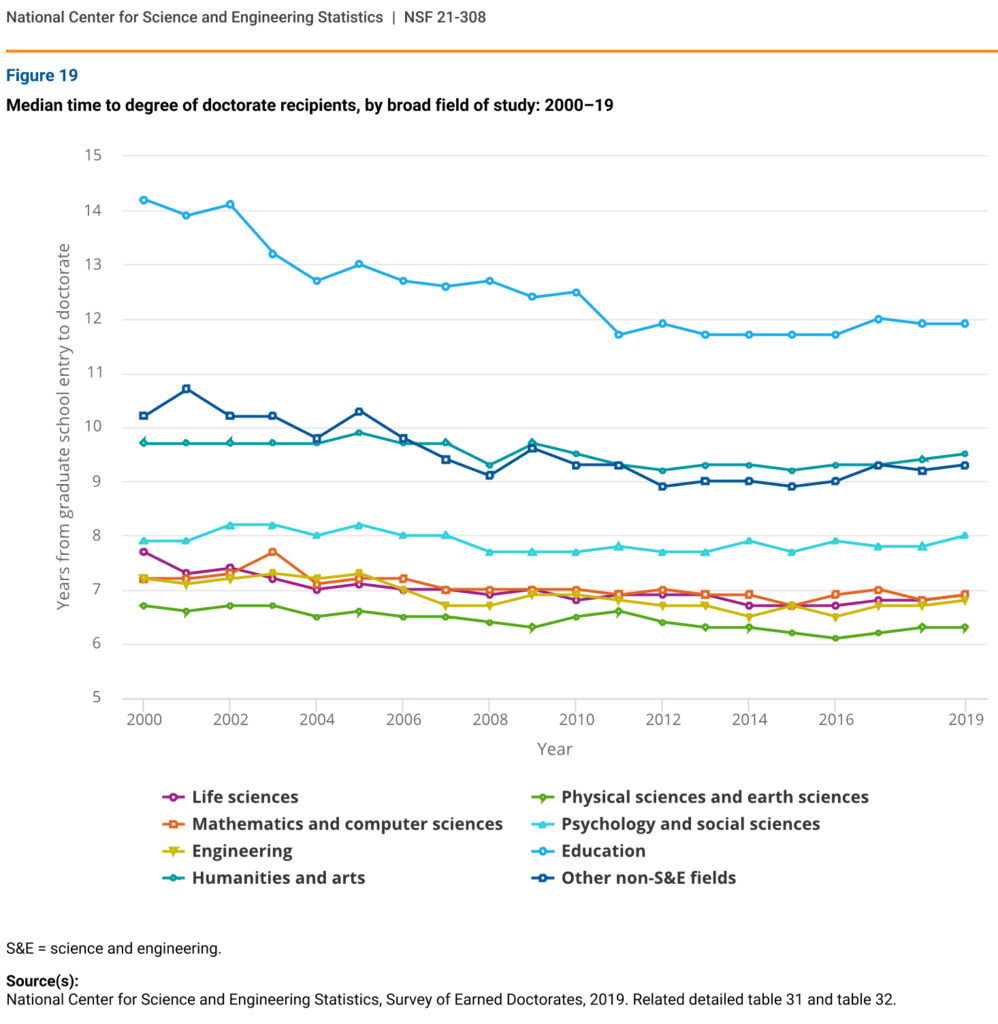
This delay in effort and reward might decrease your motivation to push forward through tough PhD time. You might lose motivation due to the delayed fruition of your efforts.
Stakeholders‘ expectations-At a job, you are mostly a part of a team executing a project. This helps in the distribution of burden as well as responsibility for the whole project. You are still penalized if the project faces the issues, however, the penalty may feel much lower than the failure of experiments after months. That said if you are in a job role with high responsibility. You may feel stressed in keeping up with the client/stakeholders’ expectations.
Lessor no freedom; certainty-The job comes with certain objectives, tasks, and routines. This presence of higher certainty is less demanding on your mental resources. However, this certainty also means that you have less room to experiment. A job may not give you choice on what, where, and who you can work with. Therefore, if you value freedom and want challenging work, some jobs might feel draining to you.
Compensation
Lower than minimum wage-No one does PhD for money. But, you as PhD student will have some present needs. In my opinion, a PhD student should be adequately compensated for his/her efforts. PhD stipend, if offered, is only a modest package to keep you alive.
- the type of PhD stipend offered in your specific field
- the type of PhD compensation you can expect in you specific field of study
- other questions you may have about PhD stipend in the US
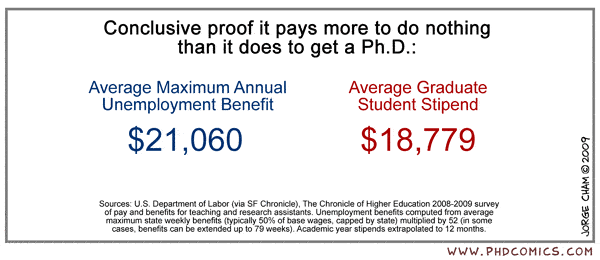
If you are single you might survive through such a low salary. If you are with family, it becomes really hard to make it through the PhD years. You can survive on PhD stipend
- if you are single
- if you are with dependents
- if you want to earn some extra income
PhD stipend is not a lot of money. If you consider living costs in the area near your campus, surviving on a PhD stipend may feel modest.
Compensation increase-At a job, the compensation increase with the increase in skill level. In most knowledge base jobs, employees can usually bargain the compensation and benefits. At a job, you can earn more and also increase your income progressively.
Career
A stable and paying career–In academia-Low salaried post-doc positions are becoming a norm after a PhD. Here I would like to quote the argument of many senior academics on many forums
“She said that research universities need to rethink the way postdocs are used — and to improve their pay and working conditions — to create the kinds of career paths that will attract the best people to research careers.
The problem isn’t the idea of a postdoc, Stephan said, but the way that position has evolved as so many more people end up in the role. “Ostensibly the postdoctoral scholar is to train someone to be a researcher, and an independent researcher,” Stephan said. “Putting people into postdoctoral positions is great training if they are going to go on and use that training,” she said.
But increasingly a postdoc doesn’t lead (certainly not quickly) to an independent, tenure-track position, Stephan said. And postdocs are being used, not trained, she said. “Postdocs have become cheap staff scientists,” she said.”
Source: Tenure Track as Alt-Ac (alternative academic careers)
Before starting a PhD you should be aware that
- you might not be able to save anything before any permanent faculty position.
- your retirement plans can be delayed.
- you might not be able to choose your work location.
The academic job market is getting more competitive day by day. Check the findings of this survey of Australian postdoc researchers to get an idea of the academic market
“Despite most researchers taking postdoctoral positions in order to develop a medium- or long-term career in research (28 and 54%, respectively), the majority of respondents do not think this will be possible because of structural (rather than personal) challenges. This is primarily due to inadequate job security (for example, short-term contracts) and a lack of funding (37% for each), lack of independent positions available (14%) and family or career responsibilities (6%).”
A survey of current standing and future directions for Australian researchers
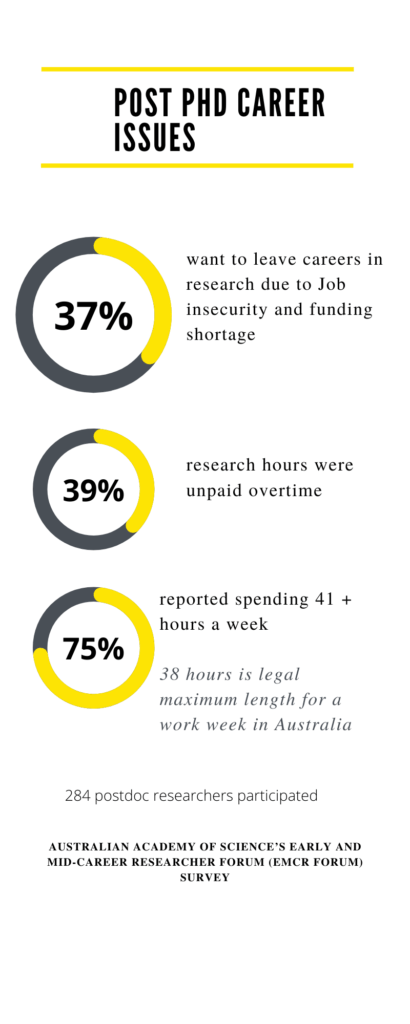
Therefore, a stable career in academia is becoming rare, which means less stable jobs for most academics.
In industry–Salary might not increase significantly after the PhD. This usually happens in humanities and social science. STEM and business PhD might get higher pay in the industry. However, the jump from a master’s to a PhD is not significant to compensate for the years spent on a PhD. This post at wes.org and this post at oedb.org argue with the data that for several fields of study lifetime difference in masters and PhD graduates earrings may not be much. There are very few disciplines, where a PhD can pay high and are really worth the effort in financial terms. Overall, everything is delayed till your graduation which can take 4-7 years.
- Opportunities increase-Your work experience matters at any job dealing in data and information.
- As a knowledge worker, you will likely have different similar work opportunities.
- The industry is much less competitive than an academic market.
- Career growth is much easier.
- You can choose between different work locations.
Why a PhD is harder than job question is important for international PhD aspirants
If you are an international PhD aspirant like me and want to pursue your PhD in some developed country. You may have certain motivations as well as concerns too.
- The face value of a PhD stipend. The difference in currency. PhD stipend when converted to your local currency sounds a handsome amount. Be careful and also estimate the living cost of a single person near your campus. It is not the money, it is the purchasing power of an average PhD stipend.
- Career in research of your favorite subject. Post PhD careers on paper look shiny. However, the ground reality of “secure” job opportunities in the academy is very different. Even in developing countries, where the academic market might seem less saturated, the job opportunities are scarce and competitive.
- The years invested in PhD. The opportunity cost of pursuing a PhD is much higher in an age of opportunities for knowledge workers. PhD is largely research training and if you do not want an academic career, you should not waste 4-7 years of your time studying a tiny topic. The industry may be more suited for you if you are still configuring a job or PhD.
You may argue that a PhD is a very different thing from a job. However, being a student of work psychology, I can’t help but see the PhD students as academic workers. The institutions may not categorize them as academic staff or faculty but, in my opinion, they are the ones doing all the hard work of research and getting lower than minimum wage for it.
Summary
| PhD is easier than a job if | PhD is harder than a job if |
|---|---|
| you want to set your own work schedule | you are interested in low breath diverse skills |
| you can deal with uncertainties | you want to develop a skill set for which market can compensate you |
| you are curious about a topic and can dedicate the next 4 to 7 years of your life to it | you prefer to engage in short term and highly organized projects |
| you can afford to defer major financial decisions for the next 4 to7 years | you want some certainty in your career |
You can make your PhD as well as job easier by
- finding a supportive advisor/boss
- finding a field of study with a high PhD stipend
- forming good interpersonal relationships with your collogues and peers
- designing a healthy work-life balance
- using planner to manage your tasks and work progress
- not comparing your productivity with others

